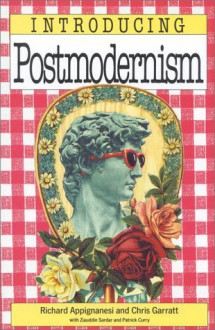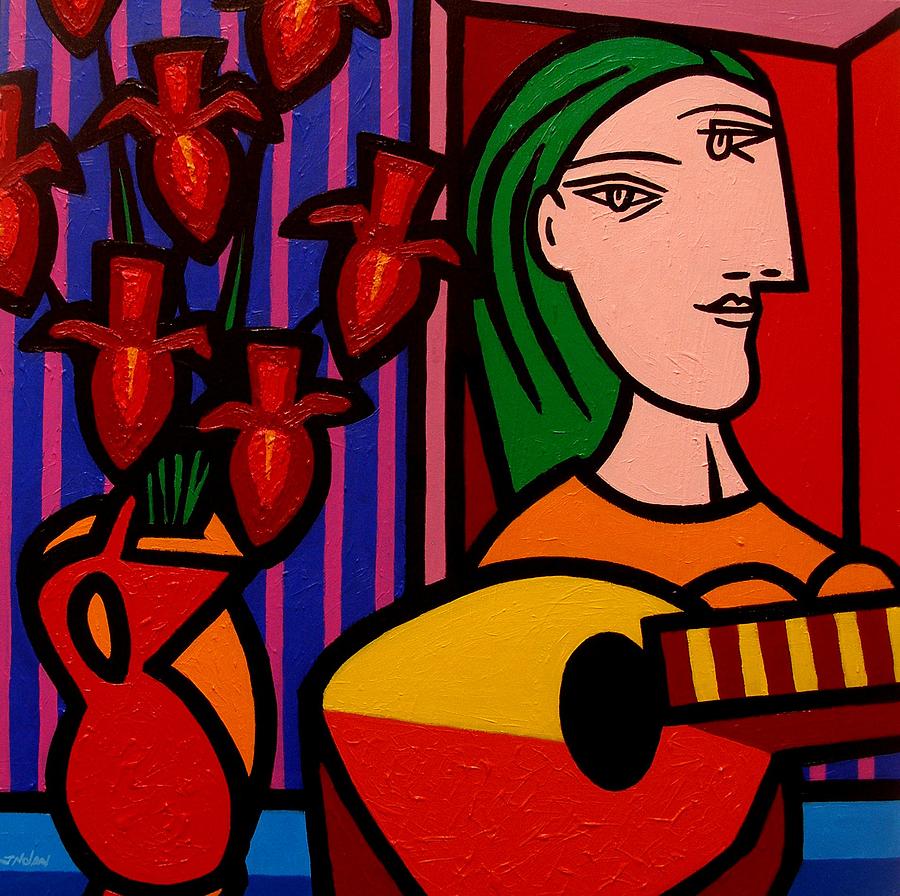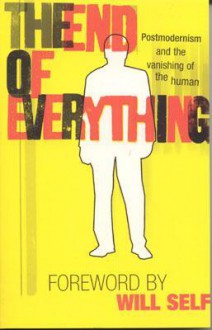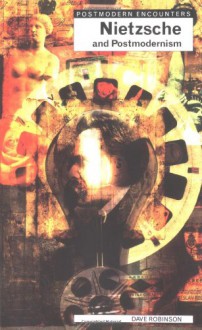
The title of the book that I read was called 'Postmodernism for Beginners' but it appears that this is the same book, though the edition that I read was published in 1995 and I suspect that there are a number of differences between the two editions. The problem though is that this book was published 20 years ago so, surprisingly, it has become dated. What the book is actually exploring is what the thought pattern of the Western World was at the time, and the thing is that during the 90s the Western World was existing in some form of dream and the question being raised 'have we come to the end of history?' This I will explore a little later in my exposition, however what I will do first is look at how this book show how we reached this point in history, and the nature of the world as it was at the time (and in many ways it has not changed, but in many other ways it has).
The term post-modernism is actually a term that really doesn't describe all that much because even though we now have an idea of what modernism is, modernism was actually be a term that has been thrown around since the middle of the Roman Empire. Basically, the term Modernism is a term that refers to something that is new or different, so when an architect in the 12th century started designing cathedrals in a new style to what was being designed at the time, his style was referred to, at the time, as modern. However, as time progressed, the style ceased to be called modern and started to be called gothic. Yet in our age this attitude has changed because the style that is referred to as modern has now been left at the period around the end of the 19th century and the beginning of the 20th century.
The term modernism came about through a number of changes during the period, the most significant being that of the camera. Prior to the invention of the camer, if one wanted to capture an image, or a person, one had to hire a pretty good artiso tp paint the picture. What the camera enabled us to do was to capture an image without the need of the time, and skill, to reproduce the image on canvas. Within a blink of an eye the artist had suddenly become obsolete. As such, to succeed as an artist, you no longer were able to simply paint a picture as perfectly as possible, but rather you had to experiment in ways such as this:

or this:

or even this:

Thus what we have is a movement away from the realistic toward what could be termed as the perspective. For instance we have artists like Monet who will paint the same scene multiple times, but at different times and emphasising different things. Instead of trying to paint a painting a realistic as possible, the realism retreats to the background and instead he emphasises other things such as colour. Other painters, such as Picasso, would paint in a way where they would perceive different things and different ideas.
Another change is that the world suddenly became a lot smaller. The telegraph and the the telephone, as well as the aeroplane and the automobile, meant that we could travel vast differences much quicker, and much less time was spent sitting around doing nothing. Basically the world had changed and the people of the world were forced to change with it. We had become industrialised and the machine had come about to assist us in our household chores. Suddenly we have a lot more spare time, but also we have become a lot more wealthier, and a lot more literate. Things such as the television meant that we could have access to stories. The world had changed and we had to change with it – this was the essence of modernism.
However, this book is about post-modernism, that which had come after this period in the later part of the 20th century. The authors seem to put the beginning of Post-modernism in the 70s, and one of the big events that we see around that time is what can be termed as the 'collapse of the western narrative'. What had changed was that people were no longer going to church. The 60s had brought about a social revolution in the Anglo-European sphere which resulted in people choosing not to go to church, and choosing not to believe in Christianity. Granted this was nothing strictly new, but what Christianity gave the Western world was a meta-narrative, namely the Biblical view of history in that the world was heading towards a point where Christ would return, judge the world, and all those who reject him would go to hell, and all those who accept him would go to heaven. However people were now throwing this narrative away and creating their own narrative, which was supported by evolution. Evolution had come front and centre but what evolution does not offer is a proper narrative.
What evolution provides is a mechanical understanding of the world in which we exist, but it does not actually provide a narrative beyond us being born, living, and ultimately dying. What we are thus given is the need to develop our own narrative which gives rise to individualism. However there was a reaction against this in the form of the Thatcher/Reagan/Right Wing Christian alliance attempt to drag the narrative back to that of Christianity. Their method: the 'red terror'.
After the end of World War II the world had sunk into a cold war between the capitalist liberal democracies of the west and the totalitarian planned economies of the east. While there was panic and paranoia during the fifties with McCarthyism, and the Cuban Missile Crisis, after Kennedy the world simply settled down into a status quo with bush wars occurring on the fringes of the empires. When the Americans finally withdrew from Vietnam it pretty much looked like the way the political sphere was structured was going to remain as it was, and thus the narrative of the good empire vs the evil empire was going settle down into a status quo. This changed when Thatcher went to war against Argentina over a couple of lumps of rocks in the South Atlantic (and won, as if the result was beyond doubt). This small war gave legitimacy to Thatcher, and in turn it supported Reagan, and all of a sudden the cold war heated up again which in the end brought about the collapse of communism and the victory of the capitalist liberal democracy.
Thus we come to the 90s, in which the enemy had been defeated and capitalism reigned supreme. What we had was no enemy and no way to focus our energies. We had won and we were now in an era where the United States reigned supreme. Thus we enter into the period in which I call 'Classic Postmodernism', the period on which this book was written.
It seems that up to this point I have been writing from an historical point of view, but that is not surprising since I think along the lines of a historian. However it appeared in all intents and purposes that we have reached the end of history. Looking back from this point it very much appeared that history was defined purely by conflict and now that the conflict between the Stalinist meta-narrative and the Western lack of narrative had been resolved in favour of the West we were looking at a blank slate, a canvas in which each and every one of us as free individuals living in a wealthy liberal democracy could paint the way we wished.
This creation of our own narrative was aided by the development of another very important technological advancement: the computer. What the computer enabled us to do was to create our own world and to immerse ourselves into it, and this has only advanced over the twenty years since this book was written. When the book was written the internet was still in its early stages, but now we can fully immerse ourselves in artificial worlds of our choosing, create our own identities (known as avatars) and interact with people through our avatars. We have in effect become like gods, being able to act out godlike abilities within these artificial worlds. The question arises as to whether these worlds are truly artificial because if the Christian meta-narrative is true, as I believe it to be true, then this world in which we live is little more than an artificial world created by a higher being in which he plays god. Thus we can create an infinite number of artificial worlds – the game within the game, or as can be seen within Shakespeare, the play within a play (and the artificial worlds are nothing new because writers have been creating these worlds for centuries, it is just the the computer enables us to add much greater definition to these worlds).
The other proof that we had reached the end of history is that technological development had effectively stopped. Without an enemy there was no need to create military apparati to attempt to beat the enemy, and there was no need to progress beyond that of the other enemy. As such, what we had was a stagnating society in which advancement only meant better designed products for us to purchase. A more stable house, a more reliable car, a faster computer, better internet speeds. Technology had stagnated. We had become trapped in our own worlds, being bombarded by the news media and the apostles of consumerism.
The internet has changed that though. No longer are our worlds dominated by the media moguls. The internet has enabled us to publish our own views, and to respond to other people's views. Computers and cheap digital cameras, and websites like Youtube mean that we can create our own content, and the internet allows us to choose our own content. We can now choose what we want to watch as opposed to relying upon the media to tell us what we want to watch. We can now respond to news articles, and the rise of social media means that we can produce content for those of us whom we are connected with. As the media moves online, we can now comment on articles and actually create a discussion across the wider community rather than within our own little circles. We can now reconnect with friends of our youth as opposed to being trapped within our own circle of friends.
Yet there was one event that suddenly woke us up out of that dream world: the events on the morning of September 11th, 2001. Some writers have suggested that that event was not all that significant, but I would disagree. It is actually incredibly significant. Granted the conflict between the Islamist meta-narrative and the Western lack of a narrative had been going on for centuries, and the conflict had also arisen during the 90s with the fatwa against Salman Rushdie and various terrorist attacks against American targets, but what September 11th represented was a surgical strike against the heart of American capitalism in a way that could not be ignored. What it did was brought conflict back to the front and centre. However, what it also did was to wake up the post-modern world – we were not going to immediately rally behind George W Bush: we were going to hold him to account. The conflict was not just between secularism and Islamism, it was between Capitalism and Socialism and Totalitarianism against the liberal democracy, however this conflict was actually going to arise within the United States and the Western world, with the people rallying against the decisions of the government while the government and the corporate interests attempting to return the world to the two coloured world of history. This was not going to happen.
Now we have entered into a new phase of history, and another event has arisen to progress us further: the stock market collapse of 2008. What that did was knock the United States off of its economic pinnacle. The United States is no longer the economic super power of the past. A new power, China, has arisen to attempt to take control of that mantle. Once again, even as the phoney war with Islam dies down, the struggle between the liberal democracy and the totalitarian state one again arises. However with the internet the era of Orwell's 1984 has now past. No longer are we bombarded with one thought and one view, but we are bombarded with many different views. There is the external cold war with China, and the internal cold war between the people and the corporations. The world has changed once again, and while many of us flee into our artificial realities that we have created on the internet, others of us are doing the best we can to make ourselves heard, because now we have the power to do so.


 Log in with Facebook
Log in with Facebook 












